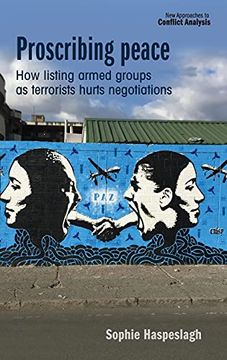Share
Proscribing Peace: How Listing Armed Groups as Terrorists Hurts Negotiations (New Approaches to Conflict Analysis) (in English)
Sophie Haspeslagh (Author)
·
Manchester University Press
· Hardcover
Proscribing Peace: How Listing Armed Groups as Terrorists Hurts Negotiations (New Approaches to Conflict Analysis) (in English) - Sophie Haspeslagh
$ 89.25
$ 113.05
You save: $ 23.80
Choose the list to add your product or create one New List
✓ Product added successfully to the Wishlist.
Go to My WishlistsIt will be shipped from our warehouse between
Friday, June 07 and
Tuesday, June 11.
You will receive it anywhere in United States between 1 and 3 business days after shipment.
Synopsis "Proscribing Peace: How Listing Armed Groups as Terrorists Hurts Negotiations (New Approaches to Conflict Analysis) (in English)"
Proscribing peace offers a systematic examination of the impact of proscription on peace negotiations. With rare access to actors during the Colombian negotiations with the Revolutionary Armed Forces of Colombia People's Army (FARC), Sophie Haspeslagh shows how proscription makes negotiations harder and more prolonged. By introducing the concept of 'linguistic ceasefire', Haspeslagh adds to our understanding of the timing and sequencing of peace processes in the context of proscription. Linguistic ceasefire has three main components: first, recognise the conflict; second, discard the 'terrorist' label, and third, uncouple the act and the actor. These measures remove the symbolic impact of proscription, even where de-listing is not possible ahead of negotiations. With relevance for more than half of the conflicts around the world in which an armed group is listed as a terrorist organisation, 'linguistic ceasefire' helps to explain why certain conflicts remain stuck in the 'terrorist' framing, while others emerge from it. International proscription regimes criminalise both the actor and the act of terrorism. Proscribing peace calls for an end to the amalgamation between acts and actors. By focussing on the acts instead, Haspeslagh argues, international policy would be better able to consider the violent actions both of armed groups and those of the state. By separating the act and the actor, change - and thus peace - become possible.
- 0% (0)
- 0% (0)
- 0% (0)
- 0% (0)
- 0% (0)
All books in our catalog are Original.
The book is written in English.
The binding of this edition is Hardcover.
✓ Producto agregado correctamente al carro, Ir a Pagar.

